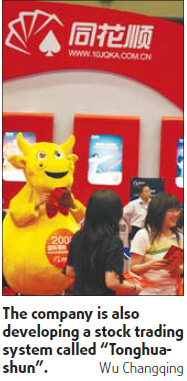After the first proposal a decade ago and years of anxious anticipation, China's long-awaited NASDAQ-style second board is just around the corner.
For many hi-tech start-ups with ambitions to list on the NASDAQ, the launch of the growth enterprise board (GEB) may actually provide them with a more suitable platform.

This is true at least for Zhejiang Hexin Flush Network Services Ltd, a stock trading system operator and financial information provider, because a listing in China's eye-catching GEB brings much more than money. It brings in clients.
The company, established in 1995 in Hangzhou, Zhejiang province, has been developing a stock trading system called "Tonghuashun" (which means 'royal flush' in poker games) since 2003.
The system now has as much as 50 million registered users in China. Among China's 107 securities firms, 95 are using the software.
The company also runs a website that ranked sixth in China's financial information portals and boasts more than 1 million hits per day.
The company's revenue is mainly from sales of its trading system to institutional investors and value-added information services.
"The IPO, which could be among the first batch of 22 companies selected by China's securities watchdog to list on the GEB, is expected to help Zhejiang Hexin to win more users," said Wang Jingjing, an analyst with China Merchants Securities who is now focusing her research on GEB.
However, competition in the stock trading area is fierce. Rival competitor "Greatwise", a similar trading system run by Shanghai-based Greatwise Network Technology Ltd, is also widely known by Chinese stock investors.
Founded in 2000, Shanghai Greatwise has been quickly gaining popularity in recent years. The company's star product - "Greatwise" (Internet version), became the most popular securities software with more than 70 million registered members, beating Zhejiang Hexin in terms of numbers of customers.
Another competitor includes financial information provider China Finance Online (www.jrj.com), a leading financial information portal in China. The company was originally funded by venture capitalists IDG Capital Partners and Singapore's Vertex Venture Holdings, and went to list on NASDAQ in 2004.
"So far as I know, among those stock software makers, Hexin is the only one that applied for a domestic listing," said a spokesman from Zhejiang Hexin who declined to be named.
"Compared with listing overseas, an IPO in GEB certainly helps Hexin in brand building, since its clients are almost all domestic," Wang, from China Merchants Securities, said.
To beat the competition and seek growth, the company is expected to use the funds raised from its GEB listing to develop its mobile-based stock trading systems, industry insiders said.
(China Daily September 2, 2009)